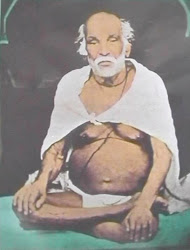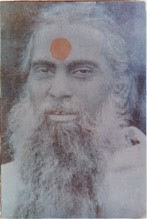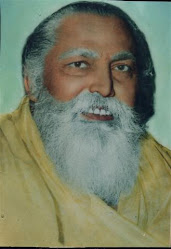After Part 1. The Principle of Sadhana, Shri Hans Raj Maharajji explains how Saint Sacha Baba sees meditation. This is a continuation of the first part on sadhana where the disciple's attitude conditions everything, for example selfless action to disolve the ego — a big obstacle to spiritual progress. In this passage on meditation, some key points — the importance of remaining in meditation in all circumstances to deepen the contact with the Higher Self, God's help.
Shri Sacha Baba Kulanandji
Extract
from SADHANA in The
Teachings of Sacha Baba
by Shri Hans Raj Maharajji
Part 2. Sacha Baba and Meditation
A human being is a slave to his desires and feelings. That is why he is called an emotional being. Among all kinds of beings, man is the only one whose emotions, thoughts and feelings arise easily and who is able to process them. Mother Nature has given this high position to man, so that If he wishes, he can rise to a higher mental and supramental state, by controlling his emotions and tendencies. In that state, the source of all emotions and desires can be witnessed. And their source is definately that Blissfulness, which human beings strive to acquire once more.
The effort to find happiness creates involvement and attachment to feelings and actions. The Sages of India have made an effort to enable man to rise above these emotions and tendencies, and meditation is our Indian contribution to this goal. The noble instruction of meditation is that after we rise above human nature and tendencies, we then reach a state where there is Bliss. In simple words,
“Meditation is to lose and forget oneself.”
The absence of oneself means absence of ego [lower self]. As long as the individual ego identifies with emotions, it is not possible to get into the state of meditation. In this state of meditation a spiritual seeker will have to rise above his ego, and he will have to remain in such a state where his body consciousness and actions slowly, slowly dissolve into their root. Mind, prana, intellect and ego are creations of the soul. They slowly, slowly stop moving and through inactivity, dissolve into their source. The spiritual seeker then enters a state where eternal bliss constantly flows. This is called “meditation”.
Saint Sacha Baba always discourages people from trying to reach that state through physical effort. He considers that meditation is only possible by grace through diligent sadhana, while remaining physically aware. He does not ask anyone to meditate with closed eyes. He says that when the Grace of the Supreme Being takes hold of a human being, he need not make any effort. When this Shakti rises up to the Atman, it will bring the disciple to such a level, that even with eyes open, he will be able to experience meditation.
While Indian Rishis stress that people have to embrace renunciation in order to experience meditation, meaning that one has to renounce action, for Sacha Baba this is not necessary. There is no need to become a travelling Monk and renounce the world. On the contrary, we must couple meditation with all activities. Doing and Not-doing are not opposed to each other. The spiritual seeker must be brought to such a state that while working, he can also remain in the state of meditation.
Saint Sacha Baba used to quote from the Bhagavad Gita with emphasis,
Yoga Karmasu Kaushalam.1
“Perfection in Action is Yoga.”
His request to spiritual seekers is to extend their meditation to such heights that “Doing” and “Not-doing” are not oppposed to each other, but by merging them they will bring harmonious results. He says,
“To renounce work is not meditation, and to renounce action is not meditation. Such meditation is dishonest and wrong for this hard working nation [India].”
Therefore, he never allows any seeker to go to a secluded cave and leave his work and responsibilities, but instructs people to be in meditation in all circumstances. Sacha Baba appears as a special Rishi who instructs people to work towards Self-realization. He says,
“The need today is not to run away to the forest, nor to sit in caves. The need today is to call on the Highest all pervading Being, who always comes to humanity out of love.”
---------------------------------------------------








